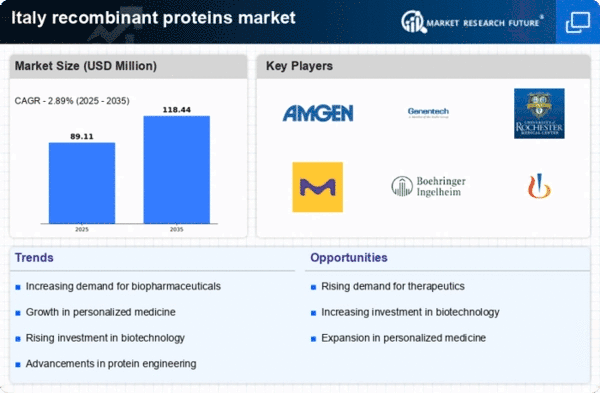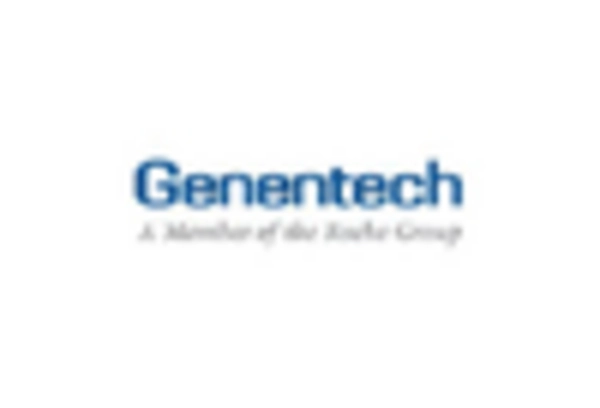Supportive Regulatory Environment
The regulatory landscape in Italy is becoming increasingly supportive of the recombinant proteins market, facilitating faster approval processes for new therapies. Recent initiatives by the Italian Medicines Agency (AIFA) aim to streamline the regulatory framework, thereby reducing the time required for clinical trials and market entry. In 2025, it is anticipated that the average time for regulatory approval will decrease by approximately 20%, encouraging more companies to invest in the development of recombinant proteins. This favorable environment is likely to enhance the competitiveness of Italian biopharmaceutical firms on an international scale. Moreover, the alignment of local regulations with European Union standards is expected to further simplify compliance for companies operating in the recombinant proteins market. Consequently, this supportive regulatory environment is poised to stimulate innovation and growth within the sector.
Growing Prevalence of Chronic Diseases
The rising incidence of chronic diseases in Italy is a critical driver for the recombinant proteins market. Conditions such as diabetes, cancer, and autoimmune disorders are becoming increasingly prevalent, necessitating advanced therapeutic solutions. In 2025, it is estimated that chronic diseases will account for over 70% of healthcare expenditures in Italy, underscoring the urgent need for effective treatments. Recombinant proteins, known for their efficacy and specificity, are increasingly being utilized in the management of these conditions. This trend is likely to propel the demand for innovative therapeutic proteins, as healthcare providers seek to improve patient outcomes. Consequently, the recombinant proteins market is expected to expand significantly, driven by the need for targeted therapies that address the complexities of chronic diseases in the Italian population.
Rising Consumer Awareness and Acceptance
Consumer awareness regarding the benefits of recombinant proteins is on the rise in Italy, contributing to the growth of the market. As patients become more informed about the advantages of biologic therapies, there is a noticeable shift towards acceptance of recombinant proteins as viable treatment options. In 2025, surveys indicate that over 60% of patients express a preference for biologic therapies over traditional pharmaceuticals, reflecting a growing trust in the efficacy and safety of these treatments. This trend is likely to drive demand for recombinant proteins, as healthcare providers respond to patient preferences. Additionally, educational campaigns by healthcare organizations are further enhancing public understanding of recombinant proteins, thereby fostering a more favorable environment for market expansion. As consumer acceptance continues to grow, the recombinant proteins market is expected to thrive in Italy.
Increasing Investment in Biopharmaceuticals
The recombinant proteins market in Italy is experiencing a surge in investment, particularly in the biopharmaceutical sector. This trend is driven by the growing recognition of the therapeutic potential of recombinant proteins. In 2025, the Italian biopharmaceutical industry is projected to reach a valuation of approximately €5 billion, reflecting a compound annual growth rate (CAGR) of around 8% over the next five years. This influx of capital is likely to enhance research and development capabilities, leading to the discovery of novel recombinant proteins. Furthermore, increased funding from both public and private sectors is expected to facilitate collaborations between academic institutions and biotechnology firms, thereby accelerating innovation within the recombinant proteins market. As a result, the overall landscape of biopharmaceuticals in Italy is poised for significant transformation, with recombinant proteins at the forefront of this evolution.
Technological Advancements in Protein Engineering
Technological innovations in protein engineering are playing a pivotal role in shaping the recombinant proteins market in Italy. Advances in techniques such as CRISPR and synthetic biology are enabling researchers to design and produce more effective recombinant proteins with enhanced therapeutic properties. In 2025, the market is projected to benefit from a 15% increase in the efficiency of protein production processes, driven by these technological advancements. This improvement is likely to reduce production costs and time, making recombinant proteins more accessible to healthcare providers. Additionally, the integration of artificial intelligence in protein design is expected to streamline the development process, further accelerating the introduction of new therapeutic options. As a result, the recombinant proteins market is positioned for robust growth, fueled by continuous innovation in protein engineering.
















